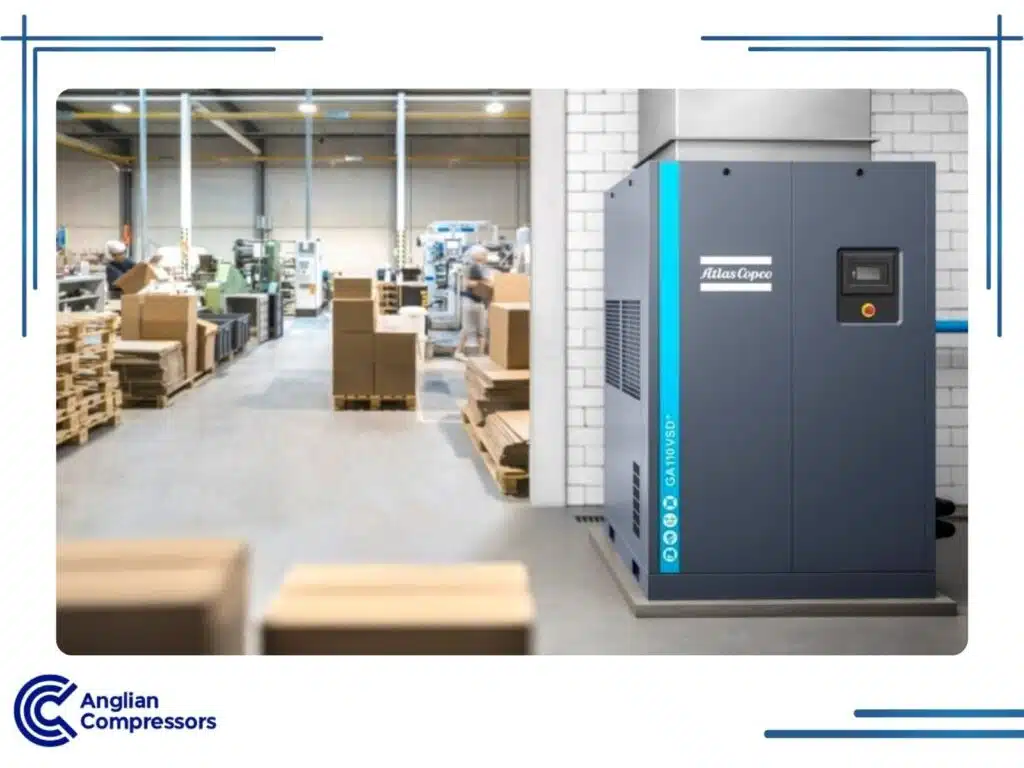Air Compressors in the Pharmaceutical Industry
The pharmaceutical industry is an essential part of modern life. Many people have a medicine cabinet with a selection of tablets and liquid medicines to deal with common ailments like an upset stomach or a self-inflicted headache. Others need medicines to assist recovery from serious illness, or even to stay alive. But making safe, effective medication for people is not an easy task and demands an exacting manufacturing process.
Compressed air is a critical part of all pharmaceutical product manufacturing. From the initial production of tablets and capsules, lozenges and syrups, and creams and lotions, to the packaging at the end, air compressors in the pharmaceutical industry do a lot of work.
And they have to work in an industry that is very highly regulated. Bodies like the UK’s Medicines and Healthcare Products Regulatory Agency, the EU’s European Medicines Agency, and the US Food and Drug Administration, not only license drugs but also take a keen interest in the pharmaceutical manufacturing process.
The importance of the pharmaceutical industry
The British pharmaceutical sector is not just good for our health, it’s good for the nation’s economy. The world’s largest pharmaceutical manufacturers operate here, creating jobs and generating billions in revenue. The UK is also a global research hub, responsible for developing approximately one-fifth of the world’s most widely used medicines.
Meeting the demands of the pharmaceutical industry requires exceptional precision and care. Strict standards for pharmaceutical manufacturing, such as Good Manufacturing Practices (GMP), ensure that every stage of production is controlled, traceable, and fully compliant with inspections. In critical pharmaceutical applications, compressed air must be clean, dry, and free from contaminants to avoid any risk of compromising the final product.
Reliable air compressors for the pharmaceutical industry are crucial for maintaining these standards, as they support a clean air supply in sterile environments like cleanrooms and aseptic packaging lines. Air is also used extensively in conveying materials, controlling systems, and protecting sensitive manufacturing areas.
Energy efficiency is another priority. With many pharmaceutical plants operating 24/7, modern oil-free rotary screw air compressors with variable speed drives (VSDs) help reduce running costs without sacrificing reliability – ensuring sustainable production that meets the highest purity standards.
Ultimately, pharmaceutical-grade compressed air underpins the sector’s ability to deliver safe, effective medicines while maintaining the UK’s leadership in global science and healthcare.
How air compressors are used in pharmaceutical manufacturing
Compressed air is incredibly versatile in manufacturing, and that versatility applies to pharmaceuticals, too. It is an ideal solution for managing drug components. These are frequently handled in dry powder form, and compressed air is an effective way to move it around.
It can also power mixers, helping to ensure an even combination of drug components — a critical task when often only a tiny part of most tablets is the active ingredient, with the rest used for delivery and release in the body.
When tablets are made, compressed air can speed up the drying and hardening of the pill and, again, move it along the process. Compressed air is used during packaging processes, where it can handle almost any packaging, boxes, plastic containers or bottles, ensuring they are filled and moved with precision.
Compressed air can also be integrated into aseptic filling machines for processes requiring sterility to ensure contamination-free packaging.
There are also uses that are not directly involved in manufacturing. Compressed air can be used to help maintain cleanroom environments, keeping surfaces and even the ambient air free from dust and the smallest particles that might contaminate drugs. And because compressed air systems can have incredibly high air quality, it does all this without the risks that might come from manual or mechanical handling.
The benefits of using compressed air
Compressed air is not the only solution for pharmaceutical production, but it remains one of the most effective. In processes where air comes into contact with products or equipment, the need for clean, contaminant-free air is critical, and pharmaceutical-grade compressed air systems meet these demands with ease.
Compressed air enables precise control during manufacturing, ensuring active ingredients and excipients are evenly distributed. This precision safeguards consistent dosing and product quality across every batch.
It also plays a key role in reducing contamination risks. By moving powders, liquids, and packaging materials without physical contact, compressed air helps maintain sterile environments and meets stringent standards for pharmaceutical manufacturing. Air treatment systems, such as desiccant dryers and high-efficiency filters, ensure that compressed air remains dry, clean, and free from oil and particulates.
Modern oil-free rotary screw air compressors with variable speed drives (VSDs) offer significant energy savings and lower running costs. With minimal maintenance needs, compressors provide a low total cost of ownership, supporting around-the-clock pharmaceutical operations with reliable, contaminant-free air.
In short, compressed air systems tailored for pharmaceutical applications not only meet regulatory standards but also help manufacturers drive efficiency, maintain product safety, and operate more sustainably.

Getting oil-free compressed air
The compressed air industry is full of options. Because of the risk of contamination in pharmaceutical manufacturing, many users opt for oil-free air compressors. This guarantees class 0, oil-free compressed air, and is ideal for compressed air that has either direct contact or even indirect contact, with drugs. However, with the correct filtration, it’s still possible to meet the class 1 air purity standard, which has less than 0.01 mg/m³ of oil, and can be used to power tools or machinery at a lower cost.
For critical applications, real-time air quality monitoring systems can be installed to ensure compliance with ISO 8573-1 standards.
The best approach is to use the air compressor that is best suited to the task. At Anglian Compressors, we offer a full design and installation service. That means we can help you select a compressor that meets the demands you will make of it, and an installation that will work with your processes.
It’s also important to ensure that compressors are regularly and properly serviced. Getting class zero compressed air with a new compressor is one thing; you have to be sure that you meet that same high-quality air standard every single time you use it.
Regular servicing should include not just replacing filters, but thorough testing of the compressor’s efficiency and the purity of the compressed air or gas it produces.
Service contracts can also include predictive maintenance tools, which help identify potential issues before they lead to costly downtime.
The final customers of the pharmaceutical industry’s end products demand the best. Whether it’s alleviating minor symptoms or treating major ailments, they need to know that their medications do what they are meant to do. And to provide that perfect solution, you have to ensure that your air compressors do exactly what they are meant to do, too. Anglian Compressors are here to make sure that’s precisely what happens.
FAQ
What air compressors are ideal for pharmaceutical applications?
Air compressors for pharmaceutical manufacturing must deliver pure air that meets the highest standards for cleanliness and reliability. Oil-free air compressors, particularly rotary screw models, are ideal because they eliminate the risk of contamination when air comes into direct contact with products. Desiccant air dryers are often used in conjunction with compressors to remove moisture, ensuring the compressed air remains free of germs and compliant with industry standards.
How is compressed air used in pharmaceutical manufacturing?
Compressed air is used throughout pharmaceutical manufacturing for various critical applications. It powers conveyors and packaging systems, assists in mixing and drying processes, and helps maintain sterile environments. In many cases, air or nitrogen is used to move powders and liquids without physical contact, ensuring the highest levels of product purity. Air systems ensure that the air is clean, dry, and free of contaminants to meet the stringent demands of pharmaceutical production.
Why are air standards for pharmaceutical manufacturing so strict?
Compressed air for pharmaceutical processes must meet strict air standards because it often comes into contact with the product or the production environment. Contaminated or impure air can compromise product safety, lead to failed regulatory inspections, and cause costly production issues. Leading manufacturers like Atlas Copco provide air equipment specifically designed to deliver pure, oil-free air that meets compressed air standards for pharmaceutical manufacturing, helping pharmaceutical companies achieve full compliance.


